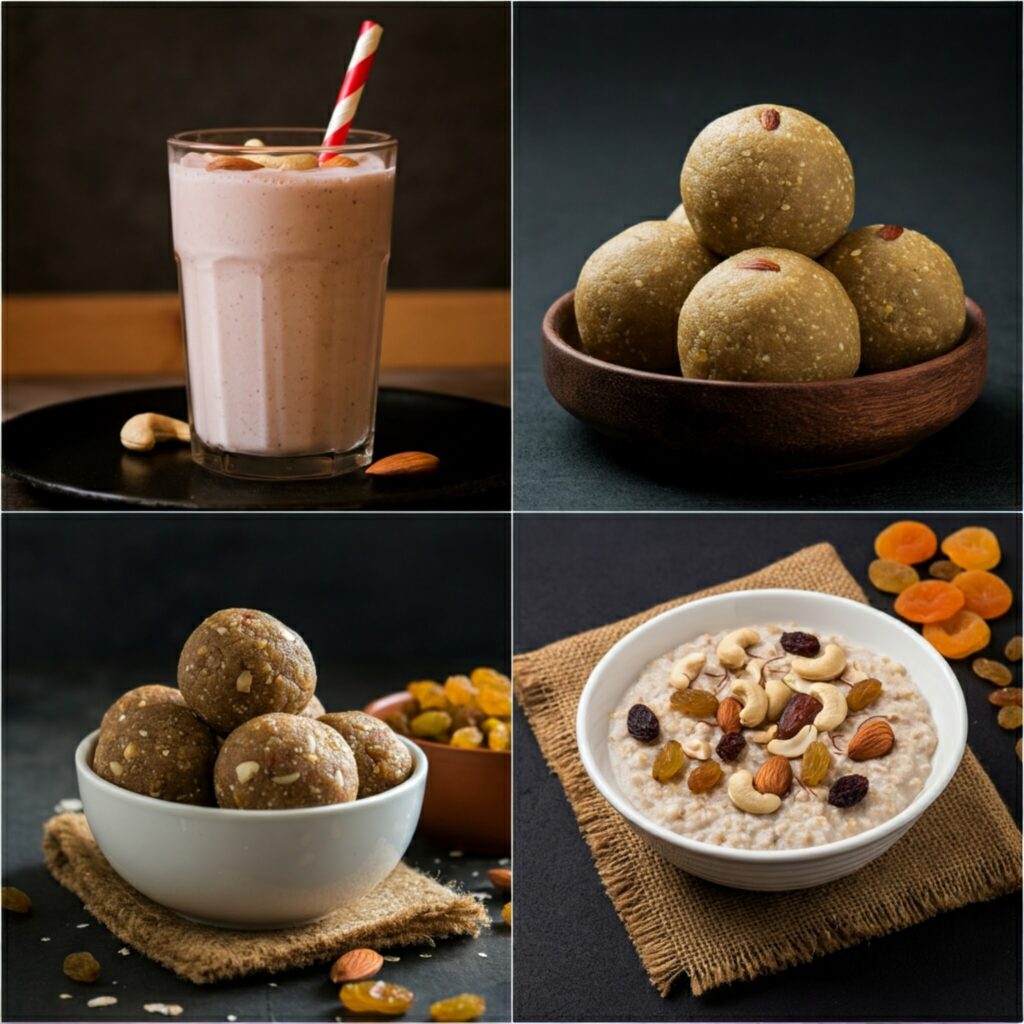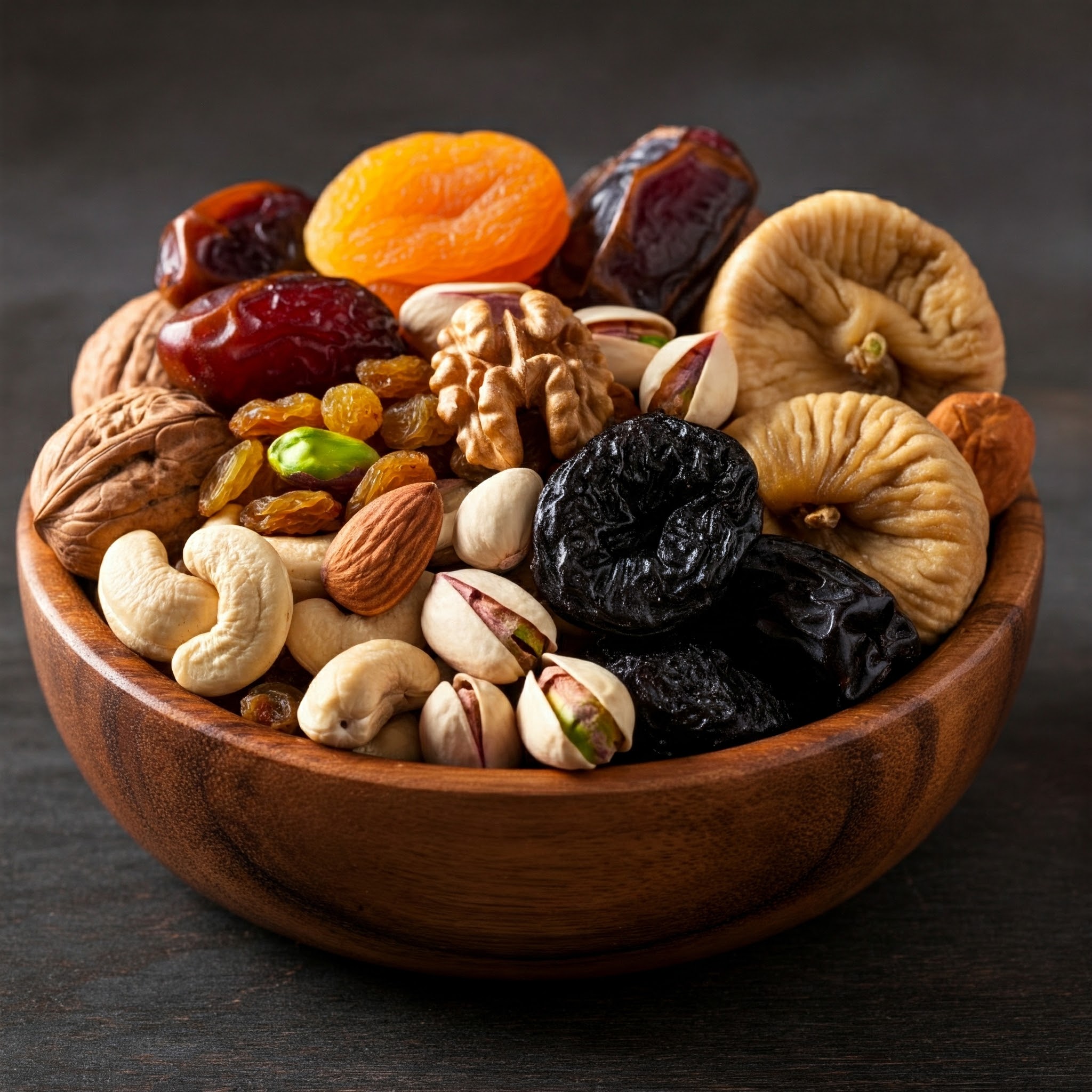Pregnancy is a time when every bite you take counts toward the health and development of your baby. For expectant mothers, balancing nutritional needs with cultural preferences can be a challenge. One versatile and nutrient-packed solution? Dry fruits.
Let’s dive into why dry fruits in pregnancy are a must-have, how to choose the best ones, and the benefits they offer.
Table of Contents
What Are Dry Fruits?
Dry fruits are fruits that have been naturally or artificially dried to remove their water content. They’re nutrient-dense and packed with vitamins, minerals, and antioxidants. Common dry fruits in Pakistan include:
- Almonds: A good source of vitamin E, magnesium, and healthy fats, almonds contribute to healthy skin, strong bones, and regulated blood sugar.
- Walnuts: Packed with omega-3 fatty acids, walnuts are brain-boosting powerhouses that support your baby’s cognitive development.
- Figs: A natural source of iron and fiber, figs help prevent anemia and keep your digestive system running smoothly.
- Apricots: Rich in vitamin A and iron, apricots support healthy vision, boost immunity, and help prevent iron deficiency.
- Raisins: A natural energy booster, raisins provide quick energy and are a good source of iron for healthy blood.
- Pistachios: Loaded with protein and antioxidants, pistachios help with muscle development and protect your body from cell damage.
- Cashews: A source of magnesium and healthy fats, cashews contribute to bone health, energy production, and overall well-being.
- Dates: A staple in Pakistani households, dates are a fantastic source of iron and fiber, crucial for combating anemia and constipation during pregnancy. They also provide a natural energy boost and may even help with labor.
- Prunes: These often-overlooked dry fruits are excellent for digestion and help regulate bowel movements, a common concern during pregnancy.
These tiny powerhouses can be a valuable addition to your pregnancy diet.
Nutritional Value of Dry Fruits in Pregnancy
Dry fruits are loaded with essential nutrients that support both maternal health and fetal development. Here’s a breakdown of their key benefits:
| Dry Fruit | Key Nutrients | Benefits During Pregnancy |
|---|---|---|
| Almonds | Vitamin E, Magnesium | Promotes healthy skin and reduces muscle cramps |
| Walnuts | Omega-3 Fatty Acids | Supports fetal brain development |
| Figs | Iron, Fiber | Prevents anemia and improves digestion |
| Apricots | Vitamin A, Iron | Boosts immunity and prevents anemia |
| Raisins | Natural Sugars, Iron | Provides energy and improves blood health |
| Pistachios | Protein, Antioxidants | Builds muscle and combats oxidative stress |
| Cashews | Magnesium, Copper | Supports bone health and energy production |
| Dates | Iron, Fiber, Potassium | Supports energy levels, prevents anemia, aids in digestion, and may help with labor. |
| Prunes | Fiber, Sorbitol, Potassium | Relieve constipation, regulates bowel movements, and contributes to overall digestive health. |
Health Benefits of Dry Fruits in Pregnancy
1. Energy Boost
Pregnancy can drain your energy, especially in the first and third trimesters. Dry fruits like raisins and apricots provide a quick energy boost thanks to their natural sugars and carbohydrates.
2. Preventing Constipation
Figs and raisins are rich in dietary fiber, which helps improve digestion and prevents constipation—a common issue during pregnancy.
3. Fetal Development
Walnuts, with their high omega-3 content, are essential for your baby’s brain development. Almonds provide Vitamin E, which supports skin health and cell growth.
4. Reducing Anemia
Iron-rich dry fruits like figs and apricots help maintain healthy hemoglobin levels, reducing the risk of anemia.
5. Strengthening Bones
Cashews and almonds are excellent sources of calcium and magnesium, which support bone health for both mom and baby.
6. Managing Gestational Diabetes
While dried fruits contain natural sugars, some, like almonds and walnuts, have a low glycemic index and can help regulate blood sugar levels. Always consult your doctor for personalized advice, especially if you have gestational diabetes.
7. Easing Labor
Dates, in particular, have been traditionally used to help prepare the body for labor. Some studies suggest that consuming dates in the later stages of pregnancy may help ripen the cervix and potentially lead to a smoother delivery.
How to Choose High-Quality Dry Fruits
Since dry fruits are considered a luxury in many Pakistani households, selecting and storing them properly ensures you get the best value for your money.
- Check Appearance: Opt for natural, unprocessed dry fruits without added sugar or preservatives.
- Smell: Fresh dry fruits should have a mild, natural aroma without any rancid smell.
- Texture: Avoid dry fruits that feel overly dry or sticky.
Where to Buy
- Local Markets: Urban bazaars often sell fresh, affordable dry fruits.
- Supermarkets: Provide cleaner, packaged options.
- Online Grocers: Convenient for home delivery but check reviews for quality assurance.
Storage Tips
- Use airtight containers to keep moisture out.
- Store in a cool, dark place to maintain freshness.
- Refrigerate if you’re in a humid area to extend shelf life.
How to Include Dry Fruits in Pregnancy Diet
Incorporating dry fruits into your meals doesn’t have to be complicated. Here are some easy and delicious ideas:
- Breakfast Boost: Add almonds or raisins to your oatmeal or porridge.
- Healthy Snacking: Create a trail mix with your favorite dry fruits and nuts.
- Desserts: Sprinkle chopped walnuts and pistachios over kheer or custard.
- Savory Dishes: Use raisins and almonds in pulao or biryani for added flavor and nutrition.
- Smoothies: Blend figs or dates with milk and bananas for a creamy, nutrient-packed drink.
- Lactation Laddoos: A traditional postpartum treat in Pakistan, these laddoos often incorporate dry fruits like almonds, cashews, and dates to help boost milk production and provide new mothers with essential nutrients.

Panjeeri: A Traditional Postpartum Superfood in Pakistan
Panjeeri is a traditional Pakistani food often given to new mothers to aid in postpartum recovery. It’s a powerhouse of nutrients, thanks to its key ingredient: dry fruits!
Why Panjeeri is beneficial for new moms:
- Restores Energy: New motherhood can be exhausting. Panjeeri provides a much-needed energy boost to help you cope with sleepless nights and the demands of caring for a newborn.
- Boosts Milk Production: Certain ingredients in panjeeri, such as gondh (edible gum) and dry fruits like almonds and cashews, are believed to promote lactation and enhance milk supply.
- Aids in Healing: Panjeeri is packed with nutrients that support healing and recovery after childbirth. It helps replenish lost nutrients and strengthens the body.
A Simple Panjeeri Recipe:
Ingredients:
- Whole wheat flour (atta): 1 cup
- Semolina (sooji): ½ cup
- Ghee: ½ cup
- Dry fruits (almonds, cashews, walnuts, pistachios, dates): 1 cup, chopped
- Seeds (poppy seeds, melon seeds, flax seeds): ½ cup
- Gondh (edible gum): 2 tbsp
- Herbal gums (optional): Shatavari, gaund katira (a type of tragacanth gum)
- Jaggery or sugar: ½ cup, powdered
- Spices (cardamom, nutmeg, ginger powder): 1 tsp, ground
Instructions:
- Dry roast the atta and sooji in a pan until lightly golden.
- In a separate pan, melt the ghee and fry the gondh until it puffs up. Remove and set aside.
- Add the dry fruits and seeds to the ghee and fry until lightly golden.
- Add the roasted atta and sooji to the pan and mix well.
- Add the powdered jaggery or sugar and spices. Mix well.
- Add the fried gondh and any optional herbal gums.
- Cook for a few more minutes until everything is well combined.
- Allow to cool and store in an airtight container.
Enjoy panjeeri as a nutritious snack or dessert during your postpartum recovery.
Potential Risks and Precautions
While dry fruits offer numerous benefits, it’s essential to consume them mindfully:
- Allergy Risks: If you’re allergic to nuts, consult your doctor before including dry fruits in your diet.
- Gestational Diabetes: Opt for unsweetened varieties and monitor portion sizes to avoid blood sugar spikes.
- Overconsumption: Too many dry fruits can lead to digestive issues or weight gain. Stick to 1-2 servings per day.
- Sulfites: Some dried fruits are treated with sulfites to preserve color and prevent spoilage. These can trigger allergic reactions in sensitive individuals. Look for unsulfured options or wash dried fruits thoroughly before consumption.
FAQs About Dry Fruits in Pregnancy
1. How many dry fruits should I eat daily? A handful (around 30g) of mixed dry fruits is ideal for daily consumption during pregnancy.
2. Are dry fruits safe for women with gestational diabetes? Yes, but choose unsweetened varieties and monitor portion sizes. Almonds and walnuts are great options.
3. Which dry fruits are best for anemia? Figs, apricots, and raisins are rich in iron and help combat anemia.
4. Can dry fruits help with morning sickness? Yes, almonds and raisins provide quick energy and help reduce nausea.
5. Are imported dry fruits better than local ones? Not necessarily. Local dry fruits can be just as nutritious if fresh and unprocessed.
6. Can I eat dry fruits if I have a history of kidney stones? It’s best to consult your doctor. Some dried fruits are high in oxalates, which can contribute to kidney stone formation.
7. Do dry fruits cause excessive weight gain during pregnancy?
No, dry fruits are nutrient-dense but not calorie-heavy when eaten in moderation. A handful a day provides essential nutrients without overloading on calories.
8. Are dry fruits too “heaty” for pregnancy?
This belief is rooted in cultural traditions, but there’s no scientific evidence to support it. Dry fruits are safe when consumed in recommended amounts.
Final Thoughts
Dry fruits in pregnancy are a nutrient-rich addition to any expectant mother’s diet. They offer a convenient way to boost energy, improve digestion, and support fetal development.
How do you include dry fruits in your pregnancy diet? Share your favorite recipes or tips in the comments, and don’t forget to share this guide with other moms-to-be!
